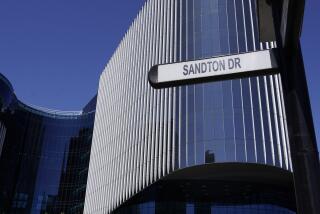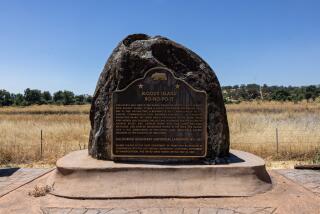‘King Way’ Name Initiative Stirs Up San Diego Voters
- Share via
SAN DIEGO — Its appearance hardly inspires high-minded rhetoric or emotions: a six-and-a-half mile stretch of roadway through some of San Diego’s poorest neighborhoods, past downtown businesses, old rental housing, junk yards, small offices, churches, liquor stores, taco stands.
Yet Martin Luther King Jr. Way has become more than a mere street these days. It is the focal point of an ideological and political battle that some say has overtones of racism and the potential of angering San Diego’s black community.
The reason for the stir is Proposition F, an initiative that will ask voters next month to repeal the name of King Way and restore the name of Market Street, which the roadway was called for 71 years.
Two Others Removed
If the initiative passes--recent polling says it will--San Diego would become the third jurisdiction in the country to remove the name of the slain civil rights leader from some kind of public recognition.
Some local black leaders say passage of the initiative would be an affront to them as well as a national disgrace, especially since the vote comes barely two months before the country’s attention is trained on San Diego as the host city for Super Bowl XXII.
“The effect on the black community here would be one of anger, insult and rejection,” said Herb Cawthorne, president and chief executive officer of the Urban League of San Diego. “And it would be a wound that will continue to bleed for a long, long time.
The Rev. W. E. Manley, president of the Baptist Ministers Union of San Diego and Vicinity, said: “It (the initiative) is racism. We can’t avoid that.”
Backers of the initiative, however, react strongly to talk of racism and say it is being used as a scare tactic to detract from the true meaning of the measure. Their goal, they say, is simply to retain the historic Market Street name while encouraging the city to search for a more appropriate memorial to King.
“A myth and . . . a fraud has been perpetrated for the purpose of defeating our initiative,” Tod Firotto, president of the Keep Market Street Committee, said about the charges of racism. “It’s a difficult fraud to expose.
Council Action
“The initiative doesn’t have anything to do with Dr. King. It doesn’t have anything to do with the black community. The initiative was a reaction to the lack of recognition and the loss of heritage” in changing Market Street.
“Don’t kill somebody else’s heritage for the sake of his (King’s),” Firotto said. “He wouldn’t want that.”
The controversy over the name of King Way had its beginnings in a January, 1986, decision by the San Diego City Council to rename a major street in honor of the Nobel Peace Prize winner. The decision was made to coincide with the first national holiday for King.
At first, then-City Manager Sylvester Murray nominated a five-mile stretch of roadway that cuts through areas of different income and ethnic groups.
But residents along the route mounted an angry protest, including objections to King’s tactics of nonviolent demonstration. Under pressure, the council set aside Murray’s recommendation and voted in April, 1986, to change the name of Market Street, as well as a stretch of local highway that is yet to be determined.
The roadway goes through or close to neighborhoods that are heavily black and low income, according to statistics from the 1980 U.S. Census.
Held Their Ground
The City Council was not swayed by protesters who asked it either to reconsider the name change or to put the matter up to a citywide election.
So they collected nearly 80,000 signatures on petitions that placed the issue on the November ballot--a move that has pained some civic leaders.
“I don’t think an issue like this helps the community,” said Lee Grissom, president of the Greater San Diego Chamber of Commerce. “It has quite the opposite effect. . . . It can only increase the tension, the pressure and the divisiveness in San Diego County.”
Just last week, Anchorage, Alaska, voted by more than 70% to take King’s name off that city’s unfinished performing arts center.
But the most publicized example has been the state of Arizona, where newly elected Gov. Evan Mecham rescinded the state’s King holiday earlier this year.
More to Read
Sign up for Essential California
The most important California stories and recommendations in your inbox every morning.
You may occasionally receive promotional content from the Los Angeles Times.










